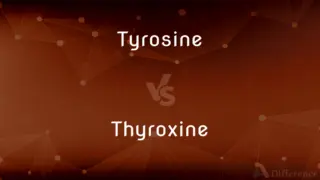Bolsheviks vs. Mensheviks — What's the Difference?
By Fiza Rafique & Maham Liaqat — Updated on March 20, 2024
Bolsheviks were a radical faction within the Russian Social Democratic Labour Party (RSDLP) advocating for a small, disciplined party of professional revolutionaries, while Mensheviks favored a larger, more democratic party open to a broader membership.

Difference Between Bolsheviks and Mensheviks
Table of Contents
ADVERTISEMENT
Key Differences
The Bolsheviks, led by Vladimir Lenin, believed in the necessity of a tightly organized party and a revolution led by the proletariat to overthrow the bourgeoisie, arguing that socialism could be achieved through a dictatorship of the proletariat, whereas the Mensheviks, under leaders like Julius Martov, advocated for a mass party model, believing in a more gradual approach to socialism through democratic and parliamentary means.
The split between the two factions occurred at the 2nd Congress of the RSDLP in 1903, initially over organizational issues, but eventually evolved into deeper ideological differences regarding the path to socialism in Russia, with the Bolsheviks insisting on a revolutionary approach and the Mensheviks supporting a more reformist, evolutionary path.
During the Russian Revolution of 1917, the Bolsheviks gained significant influence and support, leading to the October Revolution, which resulted in the overthrow of the Provisional Government and the establishment of a Bolshevik-led government, whereas the Mensheviks, failing to gain as much support, played a more marginal role and were eventually suppressed by the Bolshevik regime.
Despite both factions originating from the same party and sharing the goal of socialism, their differing strategies, visions for party organization, and methods for achieving socialist objectives led to a profound and lasting split, significantly influencing the course of Russian and world history.
Comparison Chart
Party Vision
A small, disciplined party of professional revolutionaries
A broad, democratic party open to mass membership
ADVERTISEMENT
Leadership
Vladimir Lenin
Julius Martov
Approach to Revolution
Advocated for immediate, proletarian-led revolution
Supported a more gradual, democratic transition to socialism
Role in 1917 Revolution
Led the October Revolution, establishing Bolshevik control
Played a marginal role, eventually suppressed by the Bolshevik regime
Ideological Belief
Dictatorship of the proletariat to achieve socialism
Gradual approach to socialism through democratic and parliamentary means
Compare with Definitions
Bolsheviks
Advocated for a vanguard party of the proletariat.
Lenin believed only a disciplined revolutionary party could lead the proletariat to victory.
Mensheviks
Supported a broad, democratic socialist party.
Martov's Mensheviks believed in a mass party approach, open to all supporters of socialism.
Bolsheviks
Led by Lenin, they favored immediate revolution.
The Bolsheviks orchestrated the October Revolution, seizing power in 1917.
Mensheviks
Played a secondary role in the 1917 Revolution.
Mensheviks participated in the revolution but lacked the influence and control wielded by the Bolsheviks.
Bolsheviks
Suppressed opposition, including Mensheviks.
The Bolshevik regime eventually outlawed the Mensheviks and other opposing factions.
Mensheviks
Favored a gradual transition to socialism.
They advocated for achieving socialism through democratic reforms and parliamentary methods.
Bolsheviks
Believed in the dictatorship of the proletariat.
They argued that a transitional state controlled by workers was necessary for socialism.
Mensheviks
Eventually marginalized and suppressed by Bolsheviks.
Post-revolution, the Mensheviks were sidelined and became a target of Bolshevik suppression.
Bolsheviks
Gained control and established the Soviet Union.
After the revolution, the Bolsheviks formed the government of the newly established Soviet state.
Mensheviks
Advocated for international socialism.
Mensheviks believed in the importance of international cooperation among socialist movements.
Bolsheviks
The Bolsheviks (Russian: Большевики, from большинство bolshinstvo, 'majority'), also known in English as the Bolshevists, were a radical, far-left, and revolutionary Marxist faction founded by Vladimir Lenin and Alexander Bogdanov that split from the Menshevik faction of the Marxist Russian Social Democratic Labour Party (RSDLP), a revolutionary socialist political party formed in 1898, at its Second Party Congress in 1903.After forming their own party in 1912, the Bolsheviks took power during the October Revolution in the Russian Republic in November 1917, overthrowing the Provisional Government of Alexander Kerensky, and became the only ruling party in the subsequent Soviet Russia and later the Soviet Union. They considered themselves the leaders of the revolutionary proletariat of Russia.
Mensheviks
The Mensheviks (Russian: меньшевики́), also known as the Minority were one of the three dominant factions in the Russian socialist movement, the others being the Bolsheviks and Socialist Revolutionaries. The factions emerged in 1903 following a dispute within the Russian Social Democratic Labour Party (RSDLP) between Julius Martov and Vladimir Lenin.
Bolsheviks
A member of the left-wing majority group of the Russian Social Democratic Workers' Party that adopted Lenin's theses on party organization in 1903.
Mensheviks
A member of the liberal faction of the Social Democratic Party that struggled against the Bolsheviks before and during the Russian Revolution.
Bolsheviks
A member of the Russian Social Democratic Workers' Party that seized power in that country in November 1917.
Bolsheviks
A member of a Marxist-Leninist party or a supporter of one; a Communist.
Bolsheviks
Often bolshevik An extreme radical
A literary bolshevik. In all senses also called Bolshevist.
Bolsheviks
Plural of bolshevik
Common Curiosities
What was the main difference between the Bolsheviks and Mensheviks?
The main difference lay in their approach to party organization and the path to socialism; Bolsheviks favored a tightly controlled party and immediate revolution, while Mensheviks supported a broad, democratic party and a gradual transition.
Why did the Bolsheviks and Mensheviks split?
The split originated from disagreements over party membership and organizational strategy at the 2nd Congress of the RSDLP in 1903, which later evolved into deeper ideological divides.
How did the Bolsheviks come to power?
The Bolsheviks came to power through the October Revolution in 1917, when they successfully overthrew the Provisional Government and established Bolshevik control.
How did the Bolsheviks maintain control after the October Revolution?
The Bolsheviks maintained control through a combination of political reforms, suppression of opposition, and the creation of a one-party state, eventually leading to the establishment of the Soviet Union.
What role did Lenin play in the Bolshevik movement?
Lenin was the key leader and ideologue of the Bolsheviks, shaping their revolutionary strategy, leading the October Revolution, and establishing the foundations of the Soviet state.
Did any Mensheviks join the Bolsheviks after the revolution?
Some Mensheviks did join the Bolsheviks after the revolution, either due to ideological alignment with certain Bolshevik policies or in response to the political realities of Bolshevik dominance.
What was the stance of the Mensheviks on World War I?
The Mensheviks were divided on World War I, with some advocating for a defensive stance in support of the Allies and others calling for an end to the war and a focus on domestic reforms.
What happened to the Mensheviks after the Bolsheviks took power?
After the Bolsheviks took power, the Mensheviks were gradually marginalized, persecuted, and eventually outlawed as political opposition.
Did the Bolsheviks and Mensheviks share any common goals?
Both factions shared the ultimate goal of establishing socialism but differed significantly in their methods and strategies for achieving it.
How did the Bolsheviks view the role of peasantry in the revolution?
The Bolsheviks saw the peasantry as a necessary ally in the revolution but believed that the working class should lead the revolutionary movement, with the peasantry supporting this proletariat-led revolution.
How did World War I affect the Bolsheviks' rise to power?
World War I created significant economic and social strain in Russia, leading to widespread discontent with the Tsarist regime and the Provisional Government, which the Bolsheviks capitalized on to gain support and ultimately seize power.
Were the Mensheviks involved in the initial 1917 February Revolution?
The Mensheviks, like many other socialist factions, were involved in the February Revolution, which led to the fall of the Tsarist regime, but they had differing views on the subsequent direction of the revolution.
What was the impact of the Bolshevik-Menshevik split on international socialism?
The split had a significant impact on international socialism, influencing socialist and communist parties worldwide and contributing to the division between reformist and revolutionary approaches within the international socialist movement.
How did the general Russian population react to the Bolshevik-Menshevik split?
The general Russian population's reaction to the split was mixed, with some supporting the Bolsheviks' call for immediate revolution and others favoring the Mensheviks' more moderate, reformist approach, reflecting the broader societal divisions and diverse political aspirations within Russia at the time.
What were the key ideological influences on Bolshevik thought?
Bolshevik ideology was heavily influenced by Marxist theory, particularly the works of Karl Marx and Friedrich Engels, with Lenin further developing these ideas to suit the Russian context.
Share Your Discovery

Previous Comparison
Flatness vs. Roughness
Next Comparison
Euryhaline vs. StenohalineAuthor Spotlight
Written by
Fiza RafiqueFiza Rafique is a skilled content writer at AskDifference.com, where she meticulously refines and enhances written pieces. Drawing from her vast editorial expertise, Fiza ensures clarity, accuracy, and precision in every article. Passionate about language, she continually seeks to elevate the quality of content for readers worldwide.
Co-written by
Maham Liaqat















































